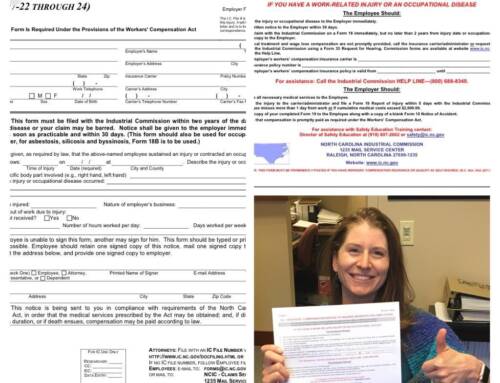Today’s post comes from attorney Anthony L. Lucas.
Criminal Penalties under the North Carolina Workers’ Compensation Act
People are often surprised to learn that there are criminal penalties under the Workers’ Compensation Act. Below is a list of some (not all) of the crimes you should know about if you are involved with the workers’ compensation system.
Class 1 Misdemeanor (1-120 days)
- Receiving a fee, consideration, or gratuity for services rendered when it has not been approved by the Commission or the court.
- Making it a business to solicit employment for a lawyer or yourself in respect of any claim or award for compensation.
- Purposely making a false statement or representation of a material fact to obtain or deny any benefit or payment that is less than $1,000.
- Purposely making a false statement or representation of a material fact to assist another person to obtain or deny any benefit or payment that is less than $1,000.
- Charging or otherwise holding an employee financially responsible for the cost of treatment when the health provider knows the treatment is for a compensable injury.
- Failing to secure the payment of compensation when the employer is required to secure it under the Workers’ Compensation Act.
- Failing to bring an employer into compliance by carrying workers’ compensation insurance or being self-insured when you have the ability and authority to do so.
Class 3 Misdemeanor (Fine-20 days)
- Any employer who makes a deduction from the pay of any employee entitled to the benefits of the Workers’ Compensation Act to pay any portion of premium paid by the employer to a carrier or to contribute to a benefit fund or department maintained by the employer for the purpose of providing compensation or medical services and supplies as required by the Workers’ Compensation Act.
Class H Felony (4-25 months)
- Purposely making a false statement or representation of a material fact for the purpose of obtaining or denying any benefit or payment, or assisting another to obtain or deny any benefit or payment that is $1,000 or more.
- Threatening an employee with criminal prosecution for the purpose of coercing or attempting to coerce the employee into agreeing to compensation or agreeing to forgo compensation under the Workers’ Compensation Act.
- Purposely failing to secure the payment of compensation when the employer is required to secure it under the Workers’ Compensation Act.







